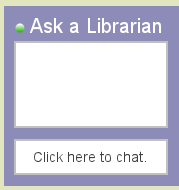Information Update - Fall 2010
The Only Constant is Change ... Library Databases
- With more than 125 separate databases listed on the library's A to Z List of Databases page, of one thing you can be sure - there will be changes to the library databases. Changes that happened since the end of the last academic year can be categorized as follows: databases that are no longer available or will be gone within the next year, new databases, databases that have changed vendor platform and enhancements to the existing vendor platforms.
- Several databases that had been available through OCLC's FirstSeach platform - AGRICOLA, EconLit, Alternative Press Index and the Alternative Press Index Archive - are no longer available. Additional FirstSearch databases will be going away within the next year, including AH Search, Books-in-Print, BusIndustry, BusManagement, CWI, Dissertations and GEOBASE.
- The Nursing Department has acquired the Nursing Reference Center (NRC). This database is on the EBSCO platform, but it uses a nursing-specific graphical interface. NRC is a point-of-care resource that delivers the best available and most recent clinical evidence and knowledge on conditions and diseases. Patient care planning and access to detailed drug information is provided via embedded HTML copies of F.A. Davis's Laboratory & Diagnostic Tests with Nursing Implications, F.A. Davis's Drug Guide for Nurses and Taber's Cyclopedic Medical Dictionary.
- In addition to the JSTOR Life Sciences Collection and the Arts & Sciences Collections I, II, III and IV which it already owned, the library has added Collections V, VI and VII. The JSTOR archives include scholarship published in more than 1,000 of the highest-quality academic journals across the humanities, social sciences and sciences. These are multi-disciplinary collections that contain complete runs of journals. They not only expand the library's journal holdings, they also serve as electronic archives of these journals.
- Several databases migrated from other platforms to the EBSCO platform. The ATLA Religion database is one that made this switch. Included in this platform is a new feature - the Scriptures authority file. This is a hierarchical, browsable list of the Protestant Bible presented in canonical order. Users may select the "expand" option to drill down from book, to chapter and verse. Selecting any given book, chapter or verse will execute a search for that scripture reference within the database. PsychINFO, PsychARTICLES and Philosopher's Index have also switched to the EBSCO platform.
- The following databases/platforms are just some of those that have undergone changes and/or enhancements since the end of the 2010 spring semester:
- RefWorks 2.0 features a new interface that includes all of the same functionality of RefWorks, but with a new look that incorporates a different color scheme, some new buttons, icons and tabs along with some enhanced functionality. If you don't like the new look, you can "toggle" back to the previous version by clicking on the RefWorks Classic link at the very top of the page. Since RefWorks 2.0 is still in "beta," there are a couple of features that haven't made the transition from Classic mode to the 2.0 version such as Write-N-Cite.
- Databases that are delivered via the EBSCO platform, such as CINAHL, Business Source Elite and MLA International Bibliography, will include more images and color-coded text. Options to refine a search will be consolidated on the left-hand side of the result list, and options to access additional resources will be added on the right-hand side of the result list. Individual databases may include additional ways to limit your search.
- Enhancements to the ERIC < http://www.eric.ed.gov/> database include the ability to add additional search terms based on the actual data in your search results; commonly used symbols can be used in your search strings, and three new search limiters, "Eric Documents Only," "Eric Journals Only," and "Peer Review" have been added to Advanced Search.
- Coming Soon ProQuest will be introducing a new platform that will include cross-search capabilities (the ability to search several databases at the same time), customizable subject-based views, more relevant results retrieved with fewer clicks, and the ability for users to personalize their account settings.
- As with all of the reference services offered to WML patrons, further instruction is always available by stopping at the Reference Desk on the library's second floor, or by calling 941-4000 for assistance.
Bonnie Oldham

